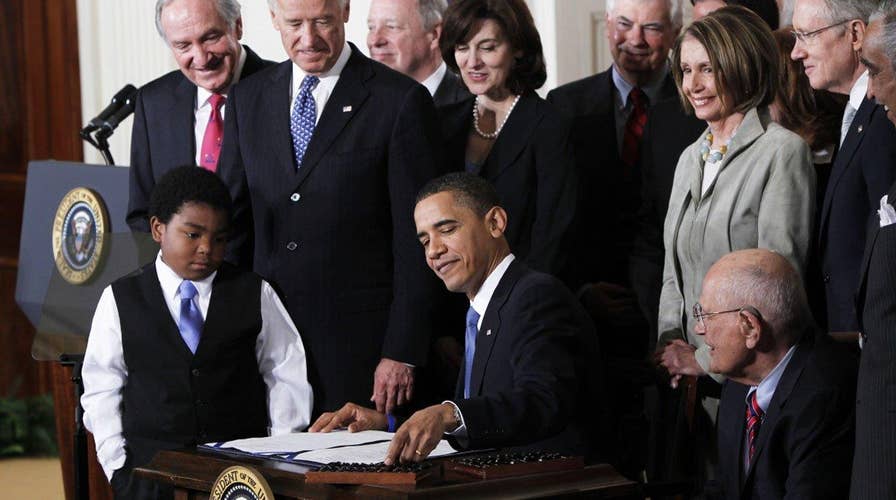GOP legislative agenda to focus on ObamaCare and tax code
Republicans insist at their retreat that they're on the same page as the president moving forward, despite the obvious split in the timelines for tackling healthcare; Peter Doocy has the details for 'Special Report'
“Actually, we got less…”
That’s how Tom Secor, a small businessman from Ohio, responded when the top Democrat on the House Small Business Committee insisted he got more health insurance options under ObamaCare at a hearing last week.
“We had one carrier that was willing to offer insurance, that’s what our insurance agent told us,” he explained. “Fewer and fewer small businesses, especially those with fewer than 50 employees, offer health insurance as an employee benefit. This is not because they do not want to, or cannot find an insurance carrier in their market; it is because they simply cannot afford to offer a plan.”
As Chairman of the Small Business Committee, I have heard from countless Americans like Tom over the last seven years who either own or work for an American small businesses.
They were promised ObamaCare would make it easier for them to access quality, affordable health insurance. In reality, it has made it more difficult.
The previous administration promised them that premiums would decrease by $2,500 per year. Instead, average premiums in job-based coverage have increased by $3,775.
President Obama famously promised: “If you like your doctor, you can keep your doctor. If you like your health care plan, you can keep your health care plan.” Nothing could be further from the truth.
ObamaCare – or the Unaffordable Care Act as it should have been titled – has been an unmitigated disaster for our nation’s 28 million small businesses.
Most Americans get their health insurance through their employer. Half the private sector workforce goes to work every day at a small business. That’s why small businesses, and the people who depend upon them, have an enormous stake in the repeal and replacement of ObamaCare. With our Committee’s hearing last week, I wanted to assure them that they will no longer be an afterthought in health care policy.
In 2016, the National Federation of Independent Businesses, or NFIB, published a survey which found that the cost of health insurance continues as the number one problem small businesses face.
NFIB members aren’t the only ones concerned. In late 2015, the National Small Business Association, or NSBA, released a survey that found that while the majority of employers think offering health insurance is very important to recruiting and retaining good employees, just 41 % of firms with fewer than five employees offered health benefits, down from 46 % in 2014. Overall, the NSBA survey found that 65 % of small firms reported offering health insurance in 2015, down from 70 % in 2014.
Surveys like these track with what we have been hearing from our constituents back home in our districts and in our hearing room.
Most employers want to do right by their employees, and try to provide health insurance for them, not just as a recruitment and retention tool, but also out of a sense of duty to people who are like family to them.
Over the years, Small Business Committee witnesses have made the case for repeal and replacement using their own experiences far better than any politician could. That’s why we have compiled their stories on our Committee’s website.
It’s no coincidence that our hearing came days before one of the most compassionate and dedicated medical professionals I know, Dr. Tom Price, was confirmed as our new Secretary of Health and Human Services.
Secretary Price understands as well as anyone how bad a deal ObamaCare has been for America’s small businesses. Our Committee looks forward to working with him as we move forward with repeal and replacement. Anyone who has a friend, family member or constituent who works for a small business should be ready to roll up their sleeves and get to work.
Last year, House Republicans put forward a series of solutions-oriented policy plans including "A Better Way to Fix Health Care" and "A Better Way to Grow our Economy." Unlike the authors of ObamaCare , we will be precise, methodical and think before we act on health care legislation.
Our small businesses deserve no less.









































